The average homeowner can fix some of the most common air conditioner (AC) problems without incurring expensive bills.
In this article, we discuss some of the most common AC problems and how to solve them.
We also discuss when to call in a technician.
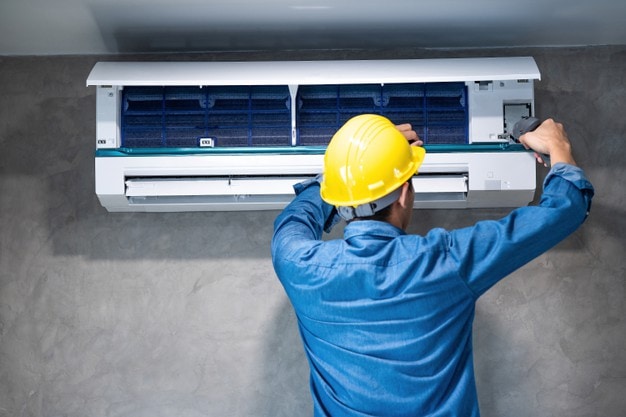
Common AC Problems
Let’s start with a list of the most common problems and possible solutions before going into more detail.
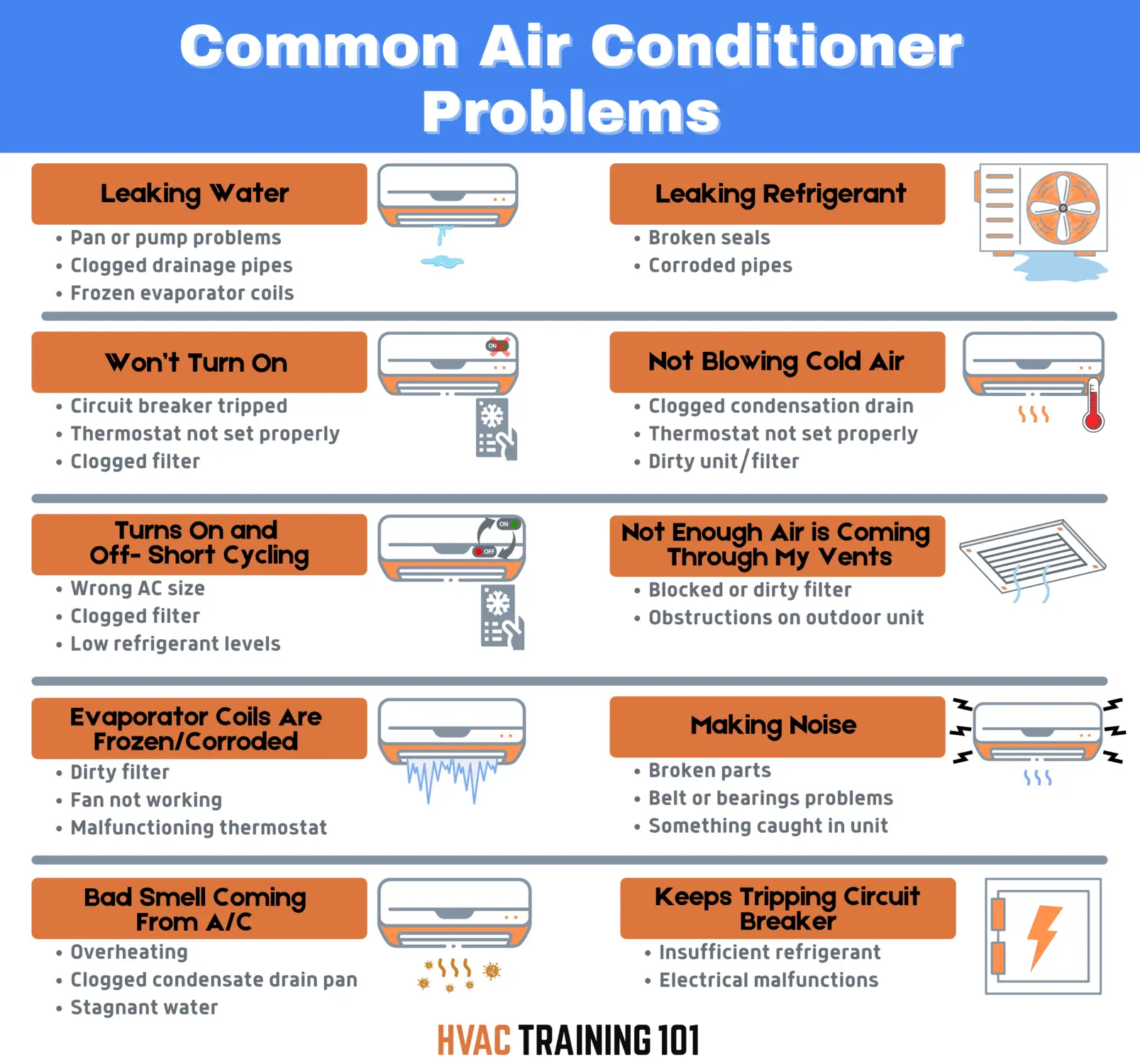
My AC is Leaking Water – What Causes This?
During the regular operation of an AC, it is typical for a small amount of condensation to form around the air handler’s coils. The air handler is the air treatment part of the AC. It consists of evaporator coils, a blower fan, and fine particulate air filters. There is a drip tray under the unit to catch condensation and a condensate drain pipe. Larger ACs may have a condensate pump, too. On most AC types, the air handler unit is indoors. Packaged units have the air handler unit in the same cabinet as the compressor.
When an AC is leaking water, the problem has to do with the condensate drains and is cheap, quick, and easy to fix. Here are the five most common causes of a water leak on the AC and how to resolve them.
Cracked Condensate Pan
The condensate pan is under the AC air handler unit. If it is cracked or broken, the condensate leaks into your living spaces instead of draining away. Replace the pan, and reconnect the drain hose to solve this problem.
Blocked Condensate Drain
The condensate drain is usually in one of the pan’s corners and has a pipe attached. Suppose the pan is overflowing; check that the drain is clear of debris. Clear the drain if it is blocked.
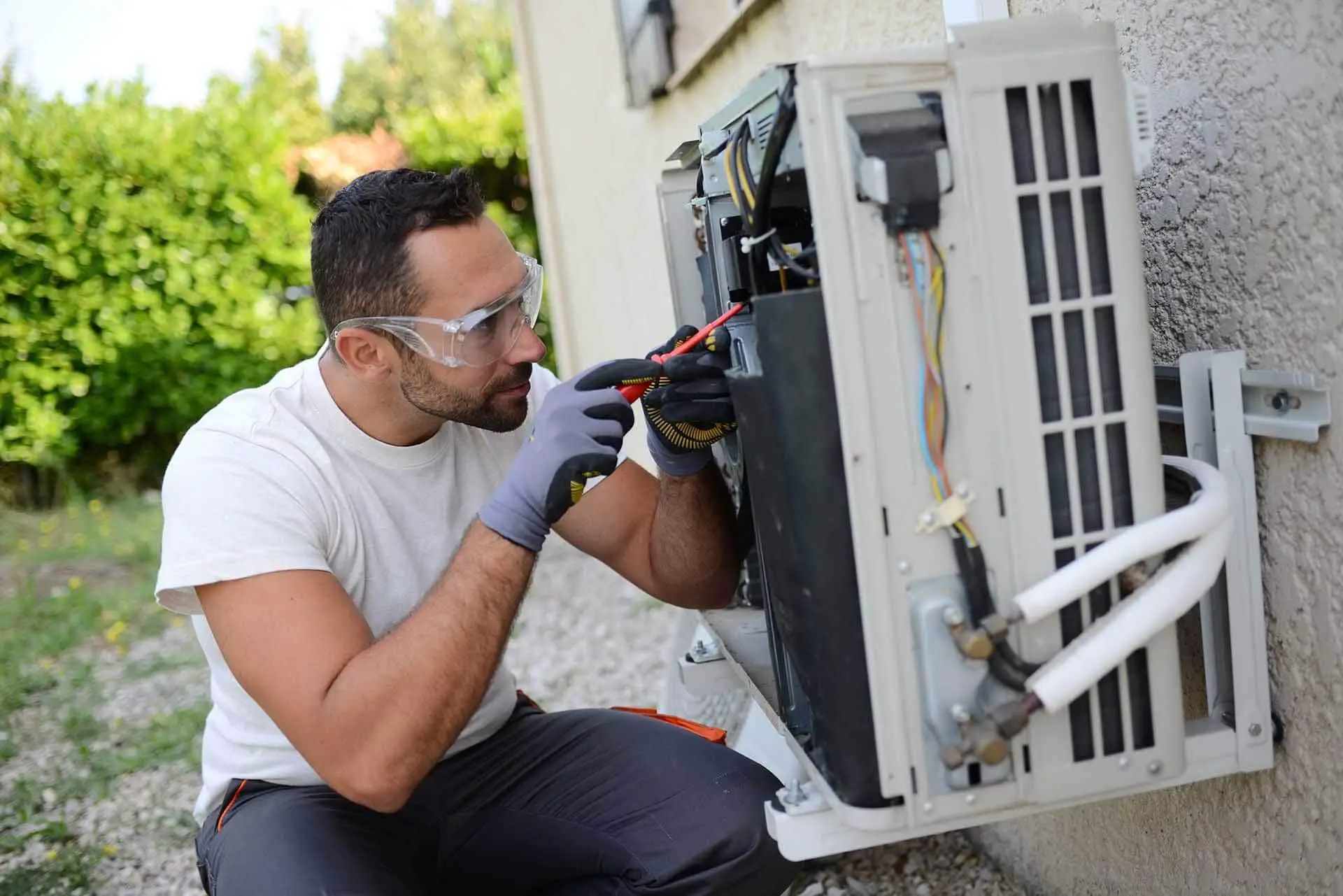
Blocked or Cracked Drainage Pipe
If the water is still not emptying from the pan, you may have a blocked drainage pipe. Algae or fungal growth often plug this pipe. Either replace the drain line or try to unblock it with a wet and dry vacuum cleaner. Pour some vinegar into the drain line to keep it clear of fungi and algae.
Clogged Air Filters
The evaporator coil in the air handler unit absorbs heat from the air blown over it by the blower fan, which then distributes it through your home. If the filters are clogged or dirty, not enough air passes over the coil, and it begins to freeze. As the ice on the coil melts, it overfills the condenser pan, which overflows. If the evaporator is icing up, check that the air filters are clean. If cleaning the air filters doesn’t clear the problem, then call an AC technician.
Low Refrigerant Levels
Icing on the coil in the air handler unit is a sign of insufficient heat transfer. In the step above, you cleaned the air filters, but this is a sign of low refrigerant levels if the problem persists. The refrigerant is in a closed system. If it is low, the technician first looks for leaks, then drains and recharges the system.
My AC Won’t Turn On – What Should I Do?
There are several reasons why an AC won’t turn on. We look at a few of the more common reasons for this and the remedy.
Check That the AC is Switched On
Although this may seem like pointless advice, it’s the first step to take. The switch for the main blower fan sometimes looks like a light switch. Somebody may have accidentally switched it off.
Check the Breakers and Fuses
Sometimes, the AC trips the power breaker on a sweltering day. If the breaker trips, switch it off and then on again. The AC should now run. If a fuse in the AC box blew, make sure that the power is off before changing it. If breakers continually trip or a fuse blows, call in a technician as there is probably an electrical fault somewhere on the AC.
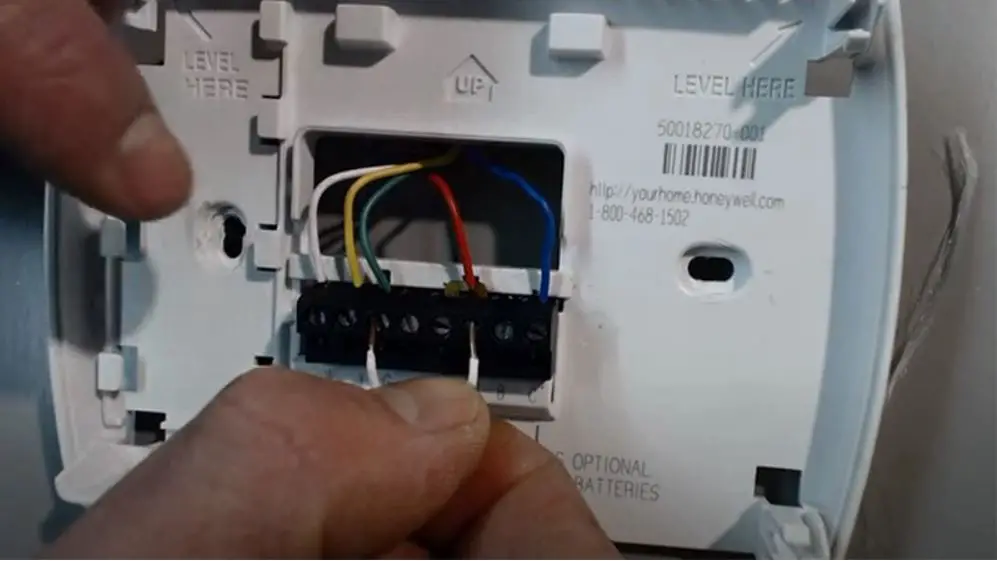
Check the Thermostat
There are three things to check on the thermostat. First, check that it is on; if the thermostat doesn’t come on, change the batteries and try again.
If the thermostat still doesn’t turn on, it may need replacing. If the thermostat is on, make sure that the setting is on “cool” and that the temperature setting is at least three degrees lower than the room’s temperature.
Check the Fans and Filters
There are two fans and sets of filters on your AC. The blower in the air handler blows warm air over the evaporator coil, transferring heat from the air to the refrigerant. It then distributes the now cool air through your home. If this fan is faulty or the filters are clogged, not enough heat transfer occurs at this point. The blower blows warm air into the house, and eventually, the compressor trips with a low-pressure safety switch. If the outside coil has the same problem, it triggers a high-pressure safety switch, shutting down the AC.
Check the Refrigerant Levels
Only a technician can do this. If you have gone through the procedure and still haven’t found the fault, then a safety switch is tripped on the system, usually due to low refrigerant levels.
My Air Conditioner is Not Blowing Cold Air – What Causes This?
If there is insufficient air blowing through the vents, check the guidance on not enough air coming through the vents. If the air is sufficient but not cold, follow these steps.
Check the Thermostat
Make sure the thermostat is on, the batteries are charged, and that the temperature setting is at least three degrees below the room’s temperature. The sensing bulb for the thermostat may also be in a colder portion of the house, like a cool hallway; if this is the case, you need to set the thermostat lower to compensate. You could also move it so it senses the warmest part of the house.
Check the Evaporator
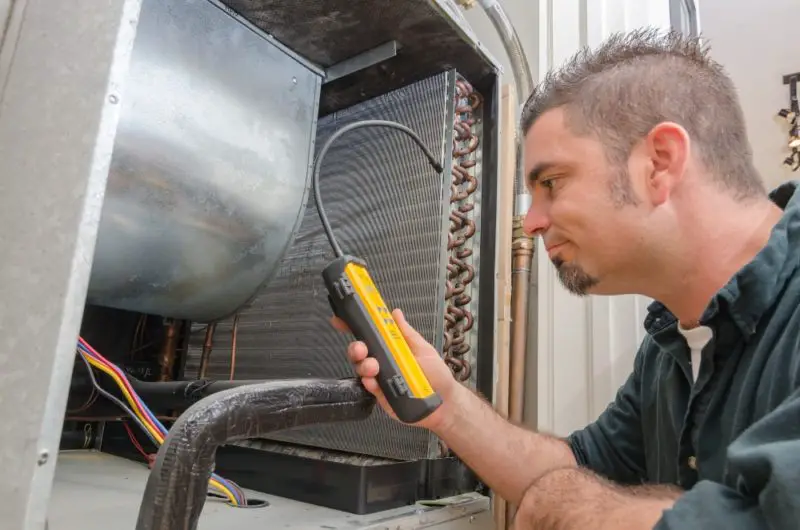
The evaporator is the coil in the air handler unit. Make sure that the evaporator is clean and ice-free. If it’s dirty, you can clean it with soapy water; if it has ice on it, switch off the AC and let it defrost. If the evaporator keeps on icing up, call in a technician—you most likely have a refrigerant leak.
Check the Condenser
The condenser is the other coil with a fan and part of the outdoor unit. Check that the condenser is clean and free of debris. Also, check that the filter isn’t clogged and the fan is running correctly. Whenever you work near fans, make sure that the AC is switched off in at least two places. Mark the switches or breakers “DO NOT SWITCH ON” to prevent accidents.
Check Refrigerant Levels
Low refrigerant levels also cause insufficient cooling. Only a technician can carry out this task.
My Air Conditioner is Making Noise – What Should I Do?
A noisy AC is an unhappy AC and is usually an expensive fix. We will deal with a few of the easy faults here and some checks you can do yourself.
A Whistling Sound From Inside or Outside
A whistling sound is an indication of a clogged filter. You can change or clean these filters easily.
A Rattling Sound
Rattling could result from dust and debris in your outdoor unit, or it could be loose parts or covers on any part of the system. Clear any dirt or debris from the outdoor cabinet and tighten any loose parts if you can. Doing this may well solve the problem.
Humming Sound
A loud humming could mean that your fan blades are dirty. Clean the fans and see if this solves your problem.
Clicking Sound
A clicking sound from the contactors is typical at start-up and shut down. If the sound is continuous, you need a technician to look at it. If any other loud noises are coming from your AC, call a technician. The loud sounds you hear could be anything from worn bearings in the fan motors to a faulty compressor. Problems like this will likely cause additional damage if not dealt with promptly. The ducting carries noises from any part of the system into the house, making it difficult to pinpoint the origin.
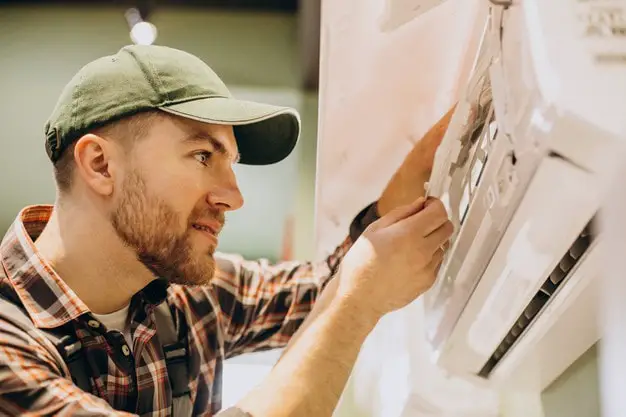
My Evaporator Coils Are Frozen/Corroded – How Do I Fix This?
Corroded coils should be replaced as soon as possible by an AC technician. Frozen coils have a few remedies that the homeowner can implement.
Defrost the Coil
Switch off the AC unit and give the coil a chance to defrost naturally before moving on to the next step. An iced evaporator leads to more severe issues if you don’t deal with it.
Check that the Evaporator Coil is Clean
A dirty evaporator coil is prone to icing. So, cleaning it with soapy water may solve your problem.
Check the Airflow
Clean or replace the filters and check that the blower is functioning correctly.
Check the Condensate Drain
The condensate drain may be blocked, leading to condensation build-up on the coil, which then freezes. If the drain is blocked, then unblock it.
Check that the Outside Temperature is Not Too Low
An AC should operate at high temperatures. If the outside temperature is too low, the evaporator coil may ice up.
Check the Refrigerant
If you have completed all the above checks and the coil continues to ice up, there is a good chance that the refrigerant is low. A technician has to check the refrigerant and inspect the system for leaks.
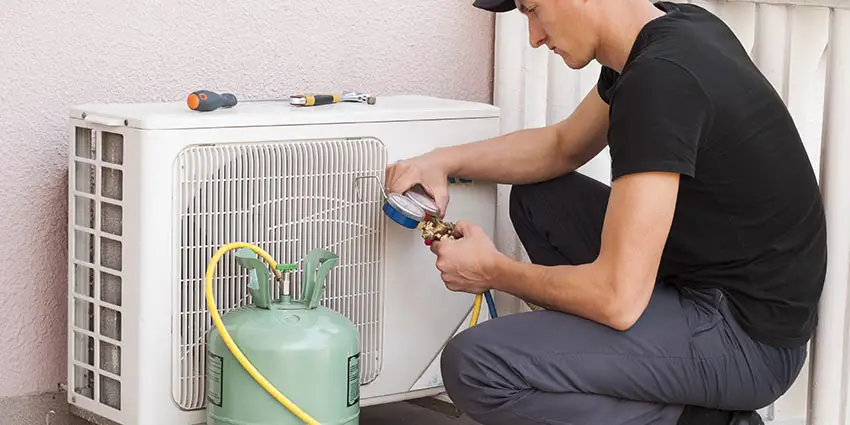
My AC is Leaking Refrigerant – What’s Causing This?
Whenever you suspect that your system is leaking refrigerant, you need to call a technician. First, look at the symptoms and eliminate other potential problems. Still, refrigerant leaks need to be dealt with as soon as possible.
To fix refrigerant leaks, the technician first runs over the system with a leak detector to identify leaking lines and then recovers any refrigerant in the system. Once he has repaired the leaks, the technician must pull a vacuum on the AC to check its integrity and remove any impurities that could damage the compressor before refilling. Sometimes it’s more feasible to replace the entire AC. Below are the five most common symptoms of a refrigerant leak.
Loss of Efficiency
The AC takes longer to cool your home, and you may find yourself adjusting the thermostat to a lower setting to achieve the desired temperature.
Warm Air Blowing Through the Vents
An AC blowing warm air through the vents is a symptom of possible refrigerant loss. Check a few other things first because it could be a simple problem like a clogged air filter.
Hissing or Gurgling Sound
Hissing or gurgling in the system is a sure sign of a refrigerant leak.
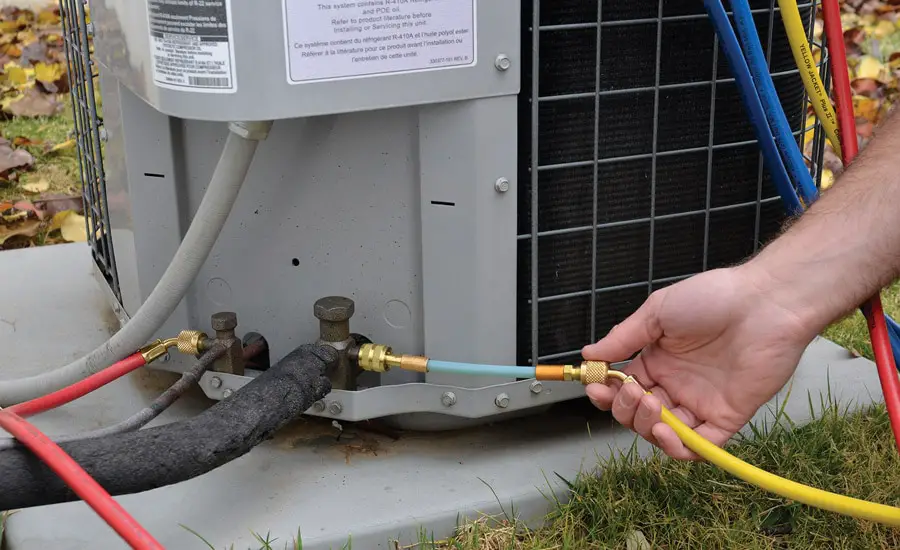
Ice on the Evaporator Coil
An iced-up evaporator coil may be dirty. If the icing is persistent, it signifies a leaking system.
High Electric Bill
The high electric bill is related to the loss of efficiency. An inefficient AC leads to higher electricity consumption. If you see a spike in the electric bill, check your AC.
AC Short Cycles
An AC that is continually turning on and off is another sign of a refrigerant leak, especially on an older system.
There’s Not Enough Air Coming Through My Vents – What Do I Do?
There are a few things to check before calling in a technician to solve this problem. The average homeowner can fix most of these quickly.
Check the Thermostat Settings
Before looking at anything else, check the thermostat settings. The thermostat setting should be at least three degrees below the house’s temperature, and the fan set to either on or auto. On auto, the fan switches off when the AC cuts off.
Check the Air Filters’ Condition
Make sure that the air filters aren’t blocked or clogged. Clean or replace dirty air filters, and your airflow will improve immediately.
Make Sure Mechanical Dampers Are Open
Some central AC units have air dampers in the vents. Make sure the dampers are free if the problem only occurs in one room.
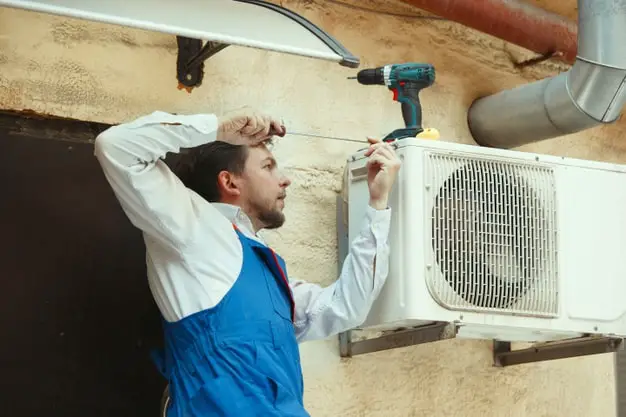
Check the Air Ducting for Leaks
Cold air leaking from the air ducts into the walls or ceiling of your home also results in low airflow to the rooms. Extra signs of leaking ductwork are dust coming through the vents and a hissing or whistling noise as the air escapes, usually around joints in the ductwork. Seal leaking ducts with a mastic sealer, or call in a technician for a more permanent solution.
Blocked or Dirty Air Ducts
Dirty air ducts also mean dust blowing through the vents and low air quality. You can also check if there is an obstruction in the ducting blocking the airflow.
Check the Blower Fan
Most often, if the fan is faulty, you can hear squealing, banging, or clanking coming through the air ducts. A defective fan is another job for the technician.
My Air Conditioner Turns On and Off (Short Cycling) – How Do I Stop This?
A short cycling AC could be a symptom of a few problems. We have listed these issues below.
Incorrectly Sized AC
With HVAC, bigger isn’t always better. If your new system is short cycling, it could be too large for the load. An AC that is too powerful short cycles as it reaches the desired cooling threshold too quickly.
Dirty Air Filters and Coils
Clogged air filters and dirty coils affect your AC’s ability to transfer heat. The system overheats and shuts off on thermal overload, then automatically resets.
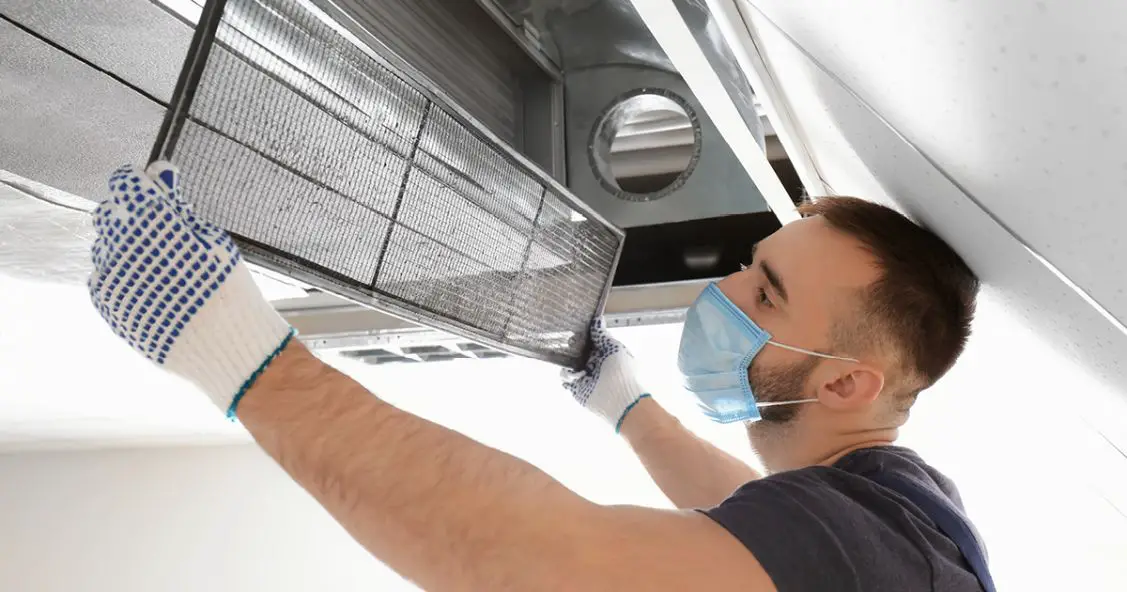
Electrical Issues
Worn electrical contactors or other electrical problems may cause short cycling. If you suspect electrical problems, have a professional look at the system.
Low Refrigerant
If the refrigerant level is low, a low-pressure switch activates, cutting off the compressor to protect it from damage. Once the low-pressure alarm resets, the compressor starts again.
What’s the Bad Smell Coming From My AC?
There is nothing worse than a bad smell permeating the house every time you run the AC. We have listed a few of the most common odors that you can get from an AC and how to remedy the problem. You can carry out most of the remedies without the help of an AC technician.
Mildewy, Dirty Sock Smell
A mildewy smell is one of the more common odors associated with an AC system. It comes from mildew and fungus build-up on the condenser tray under the evaporator. Check the condensate drain and drain pipe for blockages, and ensure that the condensate is draining away freely. A little vinegar in the drain line helps to keep it clear of fungi and algae. Wash the evaporator coil with warm, soapy water as well.
Old Ashtray or Dirty House Smell
A smell like this indicates dirty filters and a dirty evaporator coil. The filters absorb dirt and odors from the house before blowing the air over the evaporator coil. Change the filters and wash the evaporator coil with warm soapy water. By doing this, you should eliminate the smell.
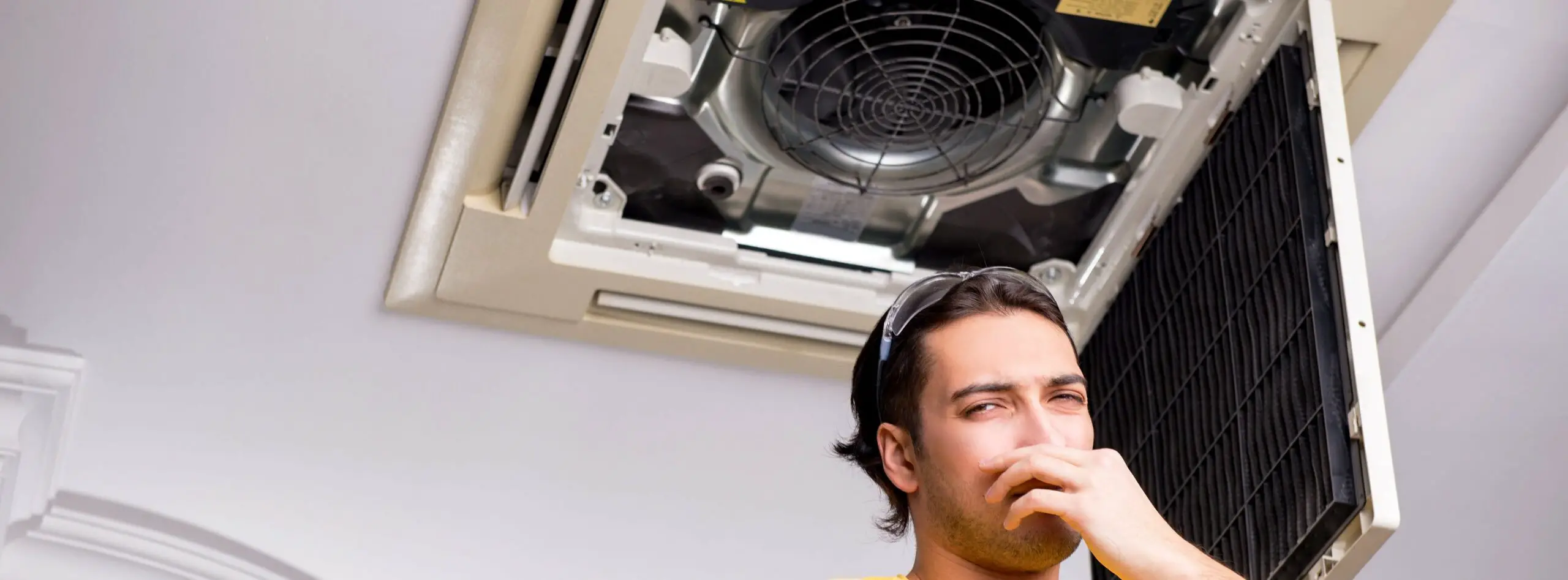
A Burning Smell
A burning smell is another typical odor associated with an AC. It could be nothing more than a dusty heater element that hasn’t been on for a while, but it could also indicate an electrical fault. Switch the AC off and locate the origin; if it is a faulty electrical component, you need to get it repaired straight away.
Animal Urine
A smell of animal urine coming from the vents indicates live rodents that have made a nest in your ducting. If you want to find the animals yourself, look for warm, dry places in your ducting. Otherwise, call in a pest control expert.
Decomposing Body
Sometimes, a bird or rodent dies in the ducting. As the body begins to decompose, the smell distributes throughout your home via ducts. The ducting needs cleaning, and the animal corpse needs to be removed to eliminate the odor.
A Nail Polish Remover Smell
A refrigerant leak often smells like a nail polish remover. Refrigerant isn’t poisonous, but it does displace the oxygen, so it is dangerous. Have an AC technician check the system.
Other Smells From the AC
Check the air intake area to eliminate the possibility that the smell’s origin is external. You could have a leaking gas main or sewage line, and the scent gets picked up from the air intake.
My AC Keeps Tripping the Circuit Breaker – What Should I Do?
An AC trips the circuit breaker when it draws more current than the circuit breaker can handle.
There are several possible causes of this, and we explore a few of the more common ones below.
Dirty Filters and Coils
If the filters are clogged, restricting airflow over the condenser or evaporator coils, the AC works harder to compensate, drawing more current. Sometimes cleaning the coils and filters solves the problem.
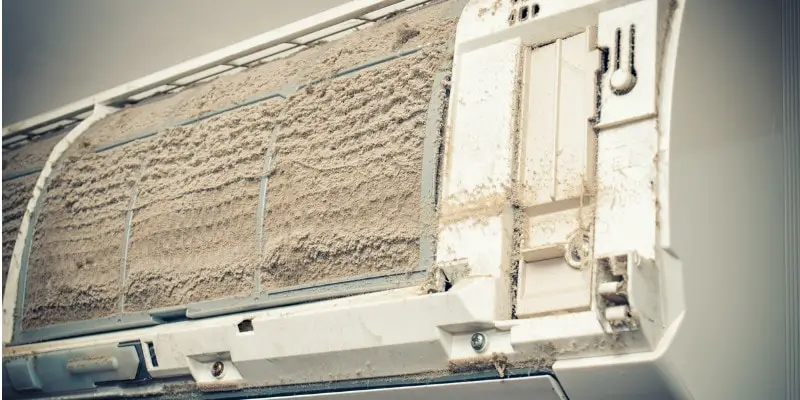
Fans or Compressors Near the End of Their Lifespan
As mechanical components age, their starting becomes more problematic, and they draw more current on start-up. Having a capacitor installed on the system solves the problem, but this is a temporary measure.
Incorrectly Rated Breaker
A breaker rated too low continually trips when the AC draws a high current. Replace the breaker with a correctly rated breaker to solve this issue.
Loose Connections
Loose connections on the breaker or motor terminals also cause the breaker to trip. An inspection from a technician or electrician solves this problem.
Air Conditioner Troubleshooting
Troubleshooting on an AC system may seem daunting, but keeping to simple procedures and walking through it step by step makes it easy. We call this the Keep It Simple, Stupid (KISS) principle. Start with the simple and easy-to-check items before moving on to more complex solutions.
Make a List of the Symptoms
Summarizing the symptoms helps you focus on the actual problem and possibly even eliminates some possible issues. Compare your list to the AC problems discussed in this article for more detailed guidance.
Compare the Symptoms To the Possible Causes
By comparing the symptoms experienced and their causes, you can determine the most likely problem with your AC. The plausible cause of your AC woes is where the symptoms and possible causes intersect.
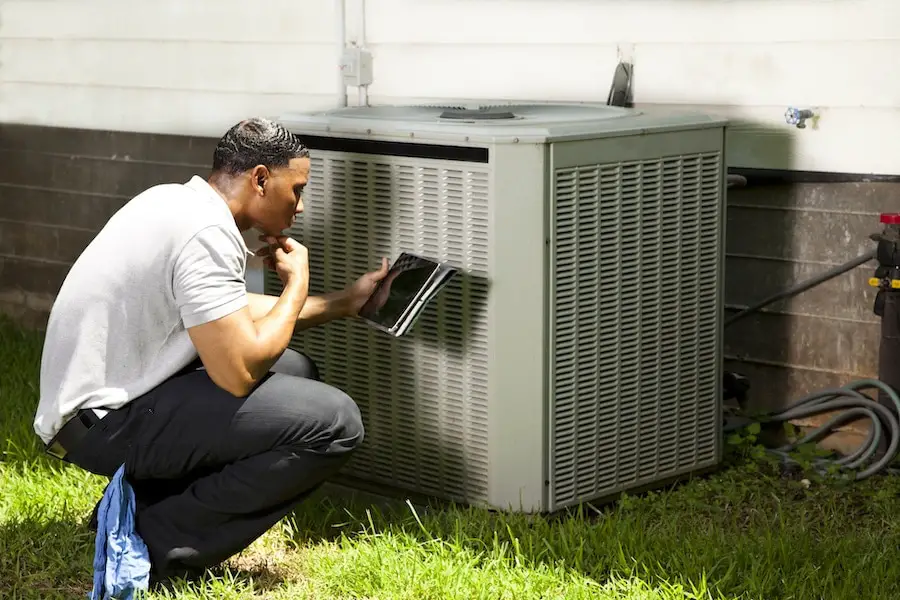
Start With the Easiest Things to Check
An AC is very robust, and most problems are simple ones to check or fix. So if your AC isn’t blowing cold air, check the thermostat settings before crawling around in the attic to clean filters and evaporator coils. Compare your list of symptoms to our list of AC problems, and start with the simplest things to check.
Work Methodically
Troubleshooting is a process of elimination. Once you have your list of symptoms and possible causes, work through them methodically to eliminate one after the other. Begin with the easiest ones, and work through them step by step until you have found the problem. Save time by dealing with all possible causes in one area before moving on to the next.
Whenever You Are In Doubt, Call In a Professional
Whenever you have any doubts, err on the side of caution and call in a professional. Even if the task seems straightforward, call a technician if you are unsure of what to do. Working on an AC can be hazardous.
Always Double Isolate When Working Around Moving Parts
AC’s work automatically, so always switch them off in at least two locations before working near fans or other moving parts. Mark it with a “Do Not Switch On” sign to avoid accidents and injury.
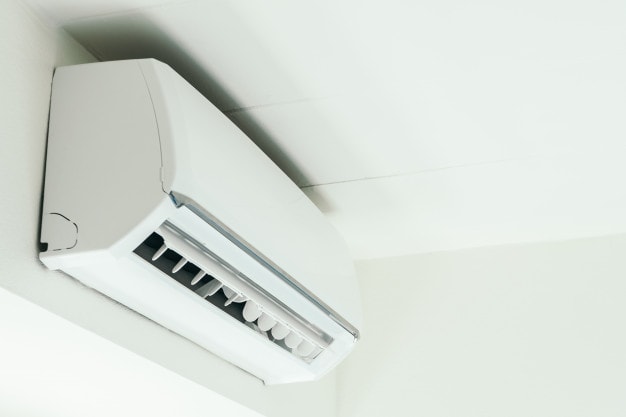
Conclusion
Most of the problems we have discussed here are either a result of aging ACs or improper maintenance. Carrying out routine tasks like cleaning filters and clearing brush and debris from around the outside unit ensures that your AC runs smoothly and economically for a more extended period.
People Also Ask
There are a few questions that people always ask regarding their AC system. We have tried to answer the most commonly asked questions below and give you a better idea of how your AC works.
The average cost to repair an AC is $319. The average range is $129 to $459. The minimum fee is around $75, and the maximum can go to $2,500. The factors that influence repair costs are location, extent, and type of repair done.
Regular maintenance of an AC extends the lifespan and reliability of the system. Easy tasks like monthly cleaning of the filters avert a lot of problems further down the line. Paying for an annual check by a qualified technician also prevents unnecessary breakdowns.
Dirty filters cause the most issues with an AC, and they are unhealthy for you, too. The restriction in airflow causes the AC to work harder to achieve the same amount of cooling. The added strain on the system causes premature failure and lower efficiency.

